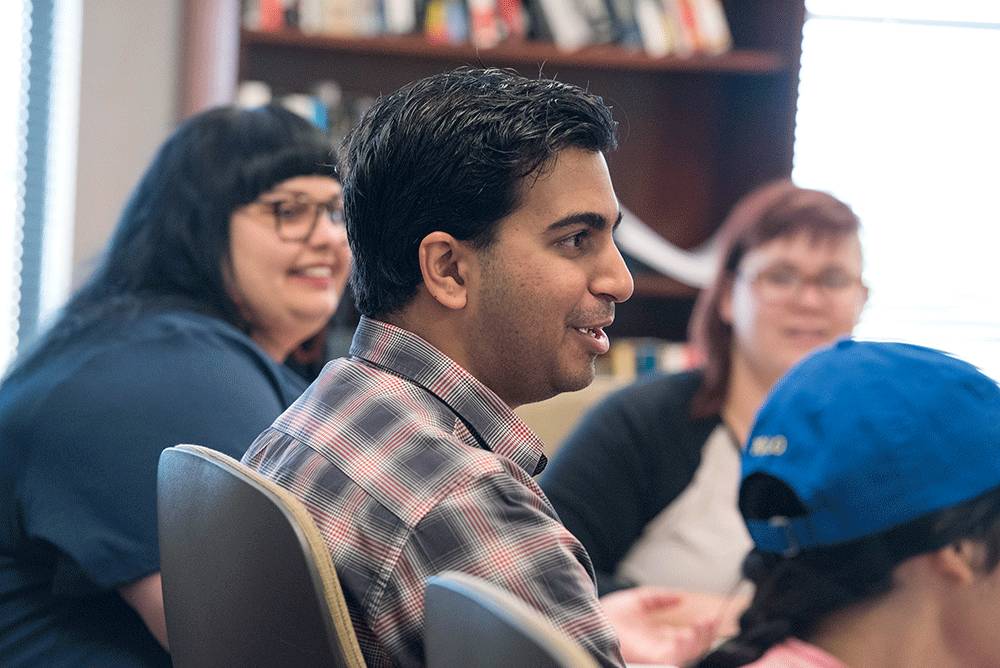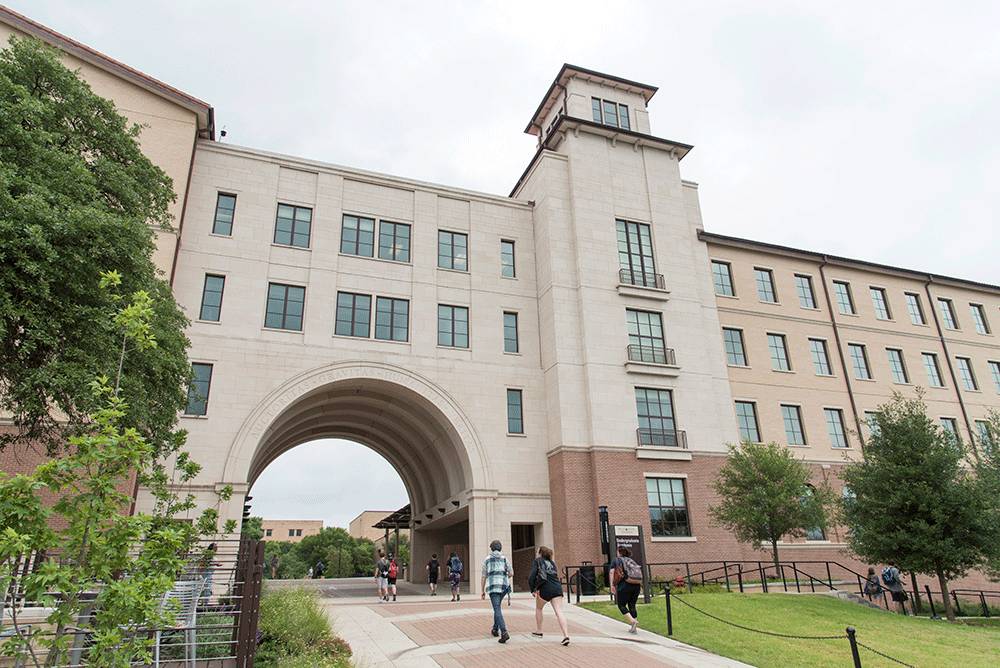Sociology (M.A.)
M.A. Sociology

Program Overview
The Department of Sociology at Texas State provides curriculum and training to help students meet the increasing demand for social scientists to address issues in a wide range of fields, including the environment, urban development, health, aging, and inequality. Our faculty work closely with our M.A. students to cultivate the expertise to excel in these fields as well as prepare them to potentially continue their studies in a Ph.D. program.
Course Work
Students will learn the major theoretical perspectives of sociology and techniques of qualitative and quantitative research in 36 hours of graduate study. Students will also have the opportunity to take courses outside the department to supplement their substantive knowledge in particular areas of interest. This degree prepares students for further study in doctoral programs as well as for careers in government, private enterprise, education (including higher education), and social services.
| Degree | Hours | Thesis Option | Minor Option | Location |
|---|---|---|---|---|
Degree M.A. | Hours 36 | Thesis Option Thesis | Minor Option No Minor | Location San Marcos |
Program Details
Graduates pursue doctoral degrees in nationally recognized programs; others teach in universities or work as advocates, research analysts, research specialists and statisticians at nonprofit and government agencies.
Program Mission
The mission of the sociology program is to provide students with an advanced understanding of sociological theory, methods, and principles that can be applied in public and private settings and nonprofit organizations. The Department of Sociology prepares graduates to become informed citizens, scholars, researchers and leaders in their communities at the local, state and national levels. The department provides an environment conductive to intellectual exchange characterized by innovative and outstanding:
- teaching and curricula
- service to students and community
- scholarship and research
- sociological practice
- commitment to multiculturalism and diversity
Career Options
Sociologists embark on various career paths growing in number and significance within the fields of research, advocacy, and teaching. Graduates will find positions in corporations, human resources, academia, state agencies, and nonprofit organizations such as:
- HR specialists
- social media coordinators
- consulting project managers
- non-profit directors
- career development counselors
- community outreach managers
- administrators
- informed activists or advocates
- diversity specialists
- college instructors
Program Faculty
Faculty are well-trained methodologically and theoretically and conduct both applied and basic research. Main areas of specialization include inequality and multicultural relations (race, class, gender, sexuality), health and illness, aging and gerontology and sustainability/environment. The sociology faculty contribute actively to the field by publishing research relevant to current issues in books and scholarly journals, often receiving national and international recognition from academic circles as well as the popular press.
Contact us for general questions about your application, funding opportunities, and more. If you have specific questions after reviewing the program details, contact the program's graduate advisor.
Graduate Advisor
Dr. David Dietrich
dd34@txstate.edu
512.245.8054
Trauth-Huffman Hall (THH), Room 449A
Advisor Support
Sara "Emrys" Williams
sw1332@txstate.edu
512.245.2113
Trauth-Huffman Hall (THH), Room 449C

Apply Now Already know that Texas State is right for you?
Application Deadlines
| Deadlines | U.S. Citizen | International |
|---|---|---|
Deadlines Fall - Priority | U.S. Citizen February 1 | International February 1 |
Deadlines Fall - Standard | U.S. Citizen July 15 (*Flexible) | International June 1 |
Deadlines Spring | U.S. Citizen October 15 (*Flexible) | International October 1 |
Deadlines Summer I | U.S. Citizen April 15 (*Flexible) | International March 15 |
Deadlines Summer II | U.S. Citizen June 1 (*Flexible) | International No Admission |
*This program’s deadline is flexible for those not requiring an F/J visa. A flexible deadline means applications received after the standard deadline may be reviewed on a first-come, first-served basis with no guarantees for admission consideration.
|
|
Funding Information Applications must be complete by the priority deadline to be considered for certain types of funding. |
|
|
Decision Timeline This program reviews applications on a rolling basis. |
Admission Requirements
The items required for admission consideration are listed below. Additional information for applicants with international credentials can be found on our international web pages.
-
Application
- completed online application
Review important information about the online application.
-
Application Fee
- $55 nonrefundable application fee
OR - $90 nonrefundable application fee for applications with international credentials
Review important information about application fees.
- $55 nonrefundable application fee
-
Transcripts & GPA
- baccalaureate degree from a regionally accredited university (Non-U.S. degrees must be equivalent to a four-year U.S. Bachelor’s degree. In most cases, three-year degrees are not considered. Visit our International FAQs for more information.)
- a copy of an official transcript from each institution where course credit was granted
- a 3.0 overall GPA or a 3.0 GPA in your last 60 hours of undergraduate course work (plus any completed graduate courses)
- background course work in sociological theory, statistics, SPSS, and social research.
Review important information about transcripts. Official transcripts, sent directly from your institution, will be required if admission is granted.
-
Test Scores
GRE
- GRE not required
Approved English Proficiency Exam Scores
Applicants are required to submit an approved English proficiency exam score that meets the minimum program requirements below unless they have earned a bachelor’s degree or higher from a regionally accredited U.S. institution or the equivalent from a country on our exempt countries list.
- official TOEFL iBT scores required with a 78 overall
- official PTE scores required with a 52 overall
- official IELTS (academic) scores required with a 6.5 overall and
- minimum individual module scores of 6.0
- official Duolingo Scores required with a 110 overall
- official TOEFL Essentials scores required with an 8.5 overall
Review important information about official test scores.
-
Documents
- Statement of purpose (two pages, double-spaced with your full name and contact information) describing your personal and career goals. Include your academic interests and the relationship of this graduate degree to your life/personal goals. Also, discuss why you are interested in this particular graduate program and explain your career goals after earning the degree. The Graduate Admissions Committee will evaluate the following:
- Did you demonstrate a familiarity with the field?
- Did you indicate your strengths (background, experience, training, and education)?
- Did you express why the program will hone your skills?
- Did your statement show excellence or promise in writing skills?
- Three letters of recommendation from individuals knowledgeable about your academic ability and promise as a scholar
- Current resume or curriculum vitae
Review important information about documents.
- Statement of purpose (two pages, double-spaced with your full name and contact information) describing your personal and career goals. Include your academic interests and the relationship of this graduate degree to your life/personal goals. Also, discuss why you are interested in this particular graduate program and explain your career goals after earning the degree. The Graduate Admissions Committee will evaluate the following:
-
Transcripts & GPA
You will be required to take background leveling courses if you lack prerequisite background and/or content area knowledge.